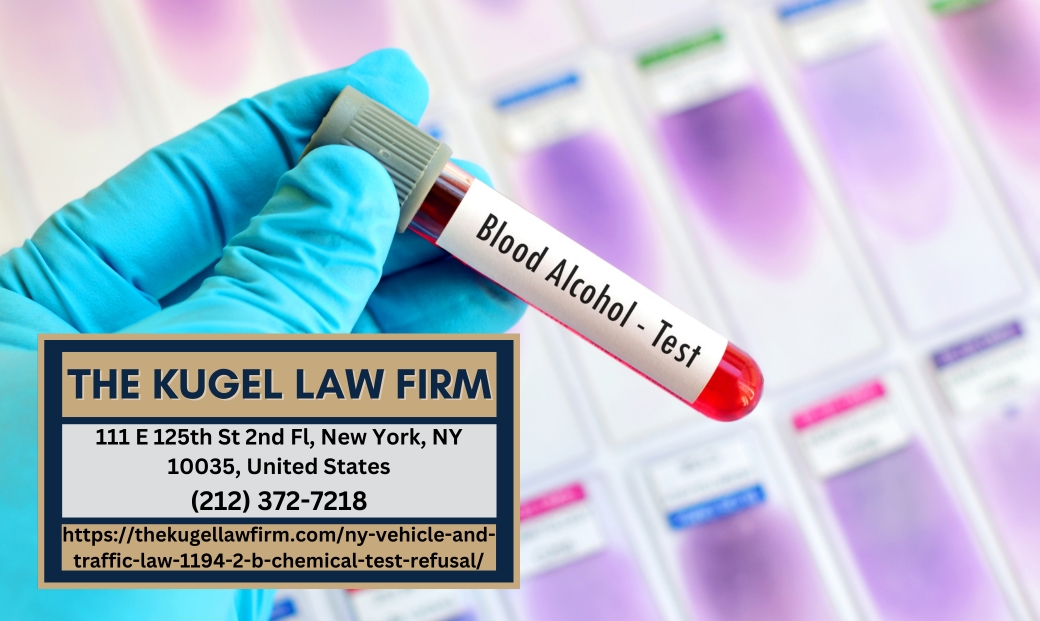New York DWI attorney Rachel Kugel (https://thekugellawfirm.com/ny-vehicle-and-traffic-law-1194-2-b-chemical-test-refusal/) is addressing the serious consequences drivers face under § 1194(2)(b) of the New York Vehicle and Traffic Law when refusing a chemical test. The law applies to drivers suspected of driving while intoxicated and establishes significant penalties for refusal, including immediate license suspension and long-term revocation. The Kugel Law Firm highlights that these penalties can apply even when a DWI charge does not result in a conviction, making it important for drivers to understand their obligations and rights.
A New York DWI attorney like Rachel Kugel explains that the statute is rooted in the concept of “implied consent,” meaning anyone operating a vehicle on New York roads is deemed to have consented to a chemical test if lawfully arrested for DWI. Chemical tests may include breath, blood, urine, or saliva testing. Under the law, refusal brings administrative penalties designed to encourage compliance and support law enforcement efforts in impaired driving cases.
Rachel Kugel, a New York DWI attorney, emphasizes that refusal is not limited to verbal denials. Failure to cooperate with test procedures, such as not providing a sufficient breath sample or staying silent after a request, also counts as refusal. According to the statute, law enforcement officers are required to inform drivers of the consequences before refusal is recorded. Once refusal is established, the driver faces an immediate suspension and must attend a Department of Motor Vehicles hearing to determine whether the suspension becomes a full revocation.
A refusal brings both immediate and lasting impacts. At arraignment, the judge imposes a suspension based on the officer’s report, and the driver is not permitted to operate any vehicle until the DMV hearing takes place. No hardship or conditional license is available during this time. If the DMV confirms the refusal, the driver’s license is revoked for at least one year. Civil fines of $500 to $750, mandatory driver responsibility assessments, and higher insurance premiums add further burdens. For those with prior DWIs or refusals, penalties increase, including an 18-month revocation and larger fines.
Rachel Kugel underscores that the DMV refusal hearing is a critical stage, separate from the criminal DWI case. At the hearing, an Administrative Law Judge considers whether the officer had lawful grounds, whether the driver was properly warned, and whether a refusal actually occurred. If all elements are proven, revocation is enforced. “If even one of the elements is not proven, the ALJ must dismiss the refusal charge, lift the suspension, and cancel the civil penalty,” the article states.
Legal defenses may play an important role in refusal cases. Rachel Kugel explains that defense strategies may include questioning whether the arrest was based on valid grounds, whether the refusal warnings were clear, or whether the driver’s behavior truly amounted to refusal. In some situations, medical conditions or miscommunication can be factors. Cross-examining the officer and highlighting inconsistencies in testimony are also potential approaches. Even when a refusal hearing is lost, it can provide insights that may strengthen the defense in the related DWI case.
The Kugel Law Firm stresses that drivers under investigation for DWI or refusal should act quickly. A refusal charge brings penalties that can disrupt employment, mobility, and financial stability. While the law is designed to deter refusals and promote compliance with testing, defendants still have the opportunity to challenge the state’s case and protect their rights.
Rachel Kugel’s focus on § 1194(2)(b) brings clarity to a law that is often misunderstood. Refusing a chemical test may appear to be a way to avoid self-incrimination, but it creates its own set of severe consequences. By raising awareness about how refusal is treated under New York law, Rachel Kugel and The Kugel Law Firm provide important guidance for individuals facing these charges.
Drivers accused of chemical test refusal are encouraged to seek representation immediately. The administrative and criminal aspects of these cases move quickly, and without a timely defense, long-term penalties may be unavoidable. Rachel Kugel highlights that addressing the refusal at the DMV hearing stage is often the best opportunity to contest the charge before permanent penalties take effect.
Rachel Kugel continues to advocate for drivers navigating these challenging legal circumstances, ensuring they understand both the risks and potential defenses available under the law. The Kugel Law Firm remains committed to protecting the rights and driving privileges of New Yorkers facing DWI-related cases.
About The Kugel Law Firm:
The Kugel Law Firm represents clients across New York facing charges related to driving while intoxicated and related offenses. Led by Rachel Kugel, the firm handles cases involving DWI defense, DMV hearings, and refusal proceedings, providing dedicated representation to individuals seeking to protect their rights and driving privileges.
Embeds:
Youtube Video: https://www.youtube.com/watch?v=BhW3qW33ZRs
GMB: https://www.google.com/maps?cid=17189431107850367088
Email and website
Email: admin@thekugellawfirm.com
Website: https://thekugellawfirm.com/new-york-dwi-lawyer/
Media Contact
Company Name: The Kugel Law Firm
Contact Person: Rachel Kugel
Email: Send Email
Phone: (212) 372-7218
Address:111 E 125th St 2nd Fl
City: New York
State: New York 10035
Country: United States
Website: https://thekugellawfirm.com/new-york-dwi-lawyer/

